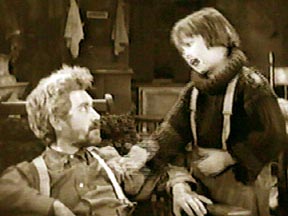The Rag Man (1925)
Director: Edward F. Cline

It may be hard to believe now, but Uncle Fester from the TV series “The Addams Family” was one of the biggest motion picture stars of the silent era. Yes, Jackie Coogan once sported a mop of Buster Brown hair and a jaunty cap instead of a shiny pate of skin and had people of all ages laughing and crying at the exploits of the tough little waif Charlie Chaplin created for him in The Kid (1923). (There’s a lot I could say about Chaplin and The Kid, but that’ll save for another day.)
Mere words cannot convey the likeability of Jackie Coogan on screen. He defies the absence of sound with his wide catalog of expressions, graceful movements, and utter naturalness. A formulaic film such as The Rag Man (lonely old man and young orphan find each other and live happily ever after) comes vividly to life with the presence of such a star. But it has other noteworthy attributes that make it worth seeking out.
Jackie plays Timothy Kelly, an 11 year old who flees his burning orphanage and insinuates himself into the home and business of a “rag man” named Max Ginsberg (Max Davidson) by offering to care for Ginsberg’s horse and cart. A plot about Jackie making an attorney give back money he made by stealing a patent he handled for Ginsberg simply serves to flesh out this slight 68-minute film and give Jackie an excuse to tug heartstrings with his patented crying scene.
What really distinguishes The Rag Man is its treatment of the character of Max Ginsberg. A Je
 w, Ginsberg is poor. He’s frugal, but not tight-fisted. He gives his last $4 to Kelly (as he calls Timothy) to let him learn how to buy rags and other junk for resale, fully expecting Kelly to blow the money fruitlessly. He takes Kelly to synagogue on Saturday and lets Kelly take him to mass on Sunday. He reads a Jewish newspaper and teaches a bit of Jewish to Kelly (shown in Hebrew-script on the intertitles). His dialogue is much as a Jew would speak (as a Jew whose grandfather was a rag man, I know this). In other words, stereotyping really doesn’t exist in this movie.
w, Ginsberg is poor. He’s frugal, but not tight-fisted. He gives his last $4 to Kelly (as he calls Timothy) to let him learn how to buy rags and other junk for resale, fully expecting Kelly to blow the money fruitlessly. He takes Kelly to synagogue on Saturday and lets Kelly take him to mass on Sunday. He reads a Jewish newspaper and teaches a bit of Jewish to Kelly (shown in Hebrew-script on the intertitles). His dialogue is much as a Jew would speak (as a Jew whose grandfather was a rag man, I know this). In other words, stereotyping really doesn’t exist in this movie. I really like how Davidson and Coogan interact. Ginsberg's relationship with Kelly is sweet and sour, like the cabbage soup he probably loves to eat, and that relationship forms the rich heart of this movie. Eddie Cline, perhaps best known for directing most of W. C. Fields' best movies, wisely uses a naturalistic approach over melodrama. Perhaps because of this, I found myself refreshed to see a child actor not aiming for an Oscar, as they do today, but acting like a child.
Other points of interest are the intertitles illustrated by Robert Hopkins that tell small stories all their own. This lost art is something I treasure about silent films. I also love the location scenes of New York in the mid 1920s as a time capsule of the era.
Turner Classic Movies (www.turnerclassicmovies.com) used The Rag Man in its 1994 Young Composers Competition, which gives up-and-coming film scorers a chance to provide a new score for a classic silent film. Linda Martinez, who tragically died at the age of 29, provided the effective score for this film. Check TCM or a specialty store for a copy of this gem from the Metro-Goldwyn (before Mayer) Studio. l


0 Comments:
Post a Comment
<< Home